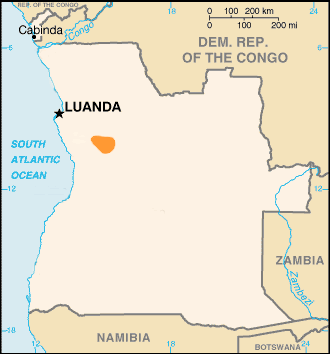The Haka Bolo people speak the language known as Kibala (also called Bolo, Haka, Ngoya, Libolo, Lubolo), which is a Bantu language in Angola and is closely related to Kimbundu. Historically, the Bolo/Haka belong to the Mbundu/ Kimbundu Language cluster in Angola. Their territory is in Kwanza Sul Province (in places such as the municipalities of Kibala, Cela, Ebo) and also in the "Libolo / Lubolo" area. They have maintained their language through generations; the language is still in use in the home, church, and trade settings.
Most Haka Bolo families live in rural and semi?rural areas of Angola, especially in Kwanza Sul Province. They use their own language (Kibala / Bolo) in daily life, while many also speak Portuguese and sometimes Kimbundu when interacting outside their immediate community. Education and literacy in their mother tongue are limited; there is no well?standardized orthography or widespread literature in Kibala. They engage in local agriculture and subsistence farming; many rely upon local trade, local markets, and mixed livelihoods. (Specifics of crops or livestock are not well documented in the sources located.)
The Haka Bolo identify predominantly as Christian. Christianity among them is not fully documented in terms of denominations (Catholic, Protestant, etc.) in the accessible sources. According to broader Angolan religious contexts, many Christians also hold traditional belief elements. Because of limited documentation, it is unclear exactly how syncretism (blending of Christian belief with traditional beliefs in ancestors, spirits, or local rituals) plays out among the Haka Bolo specifically, but this is common in many ethnic groups in Angola.
The Bolo and Haka communities need Scripture translations—whether Bible portions or the full text—into Kibala so they can worship, learn, and grow in faith more deeply in their mother tongue. In addition, they require language support and education programs that incorporate Kibala into early schooling, enabling children to become literate in their own language while also acquiring Portuguese and other necessary languages. Access to community health services is also essential, particularly maternal and child health care, disease prevention, and clinics with trained personnel located in or near their communities. To build more resilient livelihoods, they need economic and agricultural development assistance, including improved access to markets, better farming inputs, and infrastructure such as roads and storage facilities. Christian discipleship and local leadership development are equally important, ensuring that the church among the Bolo and Haka has trained pastors, teachers, and lay leaders who are grounded in both the Christian faith and the local cultural context. Finally, there is a pressing need for materials in Kibala—such as audio resources, films, and evangelistic or teaching tools—since resources like the "Jesus Film" and audio recordings are currently scarce or unavailable.
Please pray that the remaining Bible translation work for the Kibala language will be completed. Pray for improved health in remote Bolo and Haka communities, that clinics and health workers would reach those in need.
Pray for the need of quality education—that schools would be well-equipped and teachers trained to teach in Kibala or support bilingual education.
Pray for the rise of strong, culturally sensitive Christian leaders among the Bolo and Haka, and that the churches in these communities would become places of deep transformation and vibrant witness.
Pray that the Haka Bolo believers would faithfully preach the gospel and make disciples among their people and world around them.
Pray for God to provide essential material resources—clean water, reliable roads, and access to markets—to enhance daily life and support sustainable livelihoods. Pray for spiritual openness among those who identify as Christian but have not yet personally followed Christ, that they might encounter him in life-changing and deeply personal ways.
Scripture Prayers for the Bolo, Haka in Angola.
Wikipedia: Bolo language (Kibala / Ngoya) article
Endangered Languages Project: Kibala / Bolo information
"Idioma bolo" (Spanish Wikipedia)
General statistics on religion in Angola (Christianity and indigenous belief contexts)
| Profile Source: Joshua Project |











